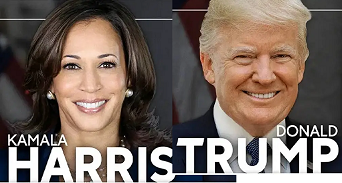BY YANET FANTAYE WOGAYEHU – The U.S. presidential election, scheduled for November 5, 2024, will be a pivotal moment for the direction of U.S. foreign policy, particularly for countries like Ethiopia, where the U.S. is the largest donor.
As the world's leading superpower, the U.S. holds significant sway in global diplomacy, economic aid, and international conflict resolution. The U.S. electoral competition has intensified with incumbent President Joseph Biden unexpectedly withdrawing from the race.
Donald Trump, a former president, represents the Republican Party and is poised to reshape U.S. foreign relations if re-elected. Kamala Harris, the sitting Vice President, is running to ensure the Democrats maintain control, likely continuing Biden's foreign policy approach, emphasizing diplomacy, human rights, and strategic alliances.
Harris has recently regained a crucial polling lead over Trump, particularly following a widely viewed debate in Philadelphia on September 10, 2024. According to a Reuters/Ipsos poll conducted after the debate, Harris leads Trump by five points, 47% to 42%. The Guardian polling tracker similarly shows Harris ahead by 0.9%, a shift from earlier in the week when the race appeared more evenly matched.
Additional polls, such as those from Morning Consult and YouGov, also indicate a stronger position for Harris post-debate, with leads ranging from three to five points. However, all the polls emphasize that the race remains highly competitive, and either Trump or Harris could emerge victorious in November.
Pundits say Harris's potential presidency signals continuity with the Biden administration’s policies, particularly in foreign policy. Yohannes Abraham is one key figure Harris could rely on for guidance on foreign policy matters, especially concerning Ethiopia. Yohannes, the U.S. Ambassador to the Association of Southeast Asian Nations (ASEAN), has been tapped for a top role in Harris’ presidential transition team. He will help the VP select her cabinet and other top officials should she win the election.
Born to Ethiopian immigrants and raised in the Washington metropolitan area, which has Ethiopia’s largest diaspora outside of Africa, Yohannes served in senior positions in the Barack Obama White House, and his current role suggests he is gearing up to take on further foreign policy responsibilities. With his roots in Ethiopia, the role of Yohannes in potential administration of Harris may signal a heightened focus on Ethiopia, balancing U.S. strategic interests with democracy and human rights as priorities for the bilateral tie.
Under a potential second Trump administration, Ethiopia could experience a shift in U.S. foreign policy, with a reduced focus on democracy and human rights, while security cooperation might take precedence. Experts say Trump’s approach to foreign policy often prioritizes personal relationships, economic interests, and security cooperation over democratic reforms, which could leave Ethiopian civil society advocates with less international support for promoting governance and human rights.
Trump’s close relationship with Egyptian President Abdel Fattah El-Sisi could impact his dealing with Ethiopian Prime Minister Abiy Ahmed, particularly the Grand Ethiopian Renaissance Dam (GERD) dispute. In 2020, Trump controversially sided with Egypt in the GERD conflict, even suggesting that Egypt might take military actions against the dam, a comment that significantly strained U.S.-Ethiopia relations. Abiy has later openly criticized Trump.
In a 2022 New Yorker profile, Abiy remarked that Trump “did a lot of damage to America’s image”; and criticized U.S. politics as being dominated by entertainment culture. While Abiy’s sharp criticism came after Trump left office, and the Prime Minister could not be faulted for not predicting Trump’s resurgence as the Republican presidential candidate in 2024, his comments marked a departure from the more restrained approach of previous Ethiopian leaders toward American leaders.
In 2008, when there was widespread optimism that Barack Obama would drastically change U.S. foreign policy, then-Prime Minister Meles Zenawi expressed a cautious view, saying that U.S. foreign policy toward Ethiopia would likely remain consistent regardless of whether a Democrat or Republican was in power.
Abiy’s more outspoken stance toward Trump could come back to haunt him if Trump returns to the White House, especially given Trump’s strong ties with Egyptian President Abdel Fattah al-Sisi. A second Trump administration could prioritize the two leaders’ personal relationships and Egypt’s security cooperation with Israel, sidelining Ethiopia’s interests and potentially reigniting old tensions between Ethiopia and Egypt.
The outcome of the U.S. election will have significant implications for Ethiopia, from its relations with Egypt, particularly regarding the GERD dispute, to the recent tensions involving Somalia, which Egypt is trying to capitalize on. Additionally, Ethiopia’s domestic political transition and conflicts, such as the Tigray civil war, which was ended through U.S.-led mediation, could be impacted by the foreign policy direction of the next U.S. president. Whether under a Harris or Trump administration, U.S. engagement will play a crucial role in shaping Ethiopia’s future on the global stage.

